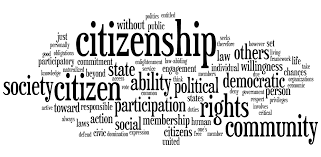
What is justice? People getting what they deserve — for good or ill. Thus talents and efforts being rewarded. That’s meritocracy.
But meritocracy has a downside, argues Michael Sandel in The Tyranny of Merit. In a society where rewards are unconnected to merit, such as a hereditary aristocracy, non-aristocrats don’t feel shamed by their deprivation. However, in a meritocracy, where winners are reckoned deserving, loserhood is compounded by the sting of feeling personal inadequacy.
That, Sandel posits, drives the populist political upsurge — the Brexit vote, the Trump vote, and so forth. A revolt by meritocracy’s losers, against the winning elites. Feeling disrespected, and resenting it. He says idealistic rhetoric about “going as far as your talents and efforts can take you” creates that resentment, in people whose talents and efforts just don’t take them very far.
Aggravated by disappearance of the 1950s kinds of jobs enabling masses to join the middle class. But rather than jobs “shipped overseas,” the far bigger factor is technology and automation. We’re manufacturing as much as ever — just doing it with much less labor. That frees up people to be productive differently, making us collectively richer. Indeed, the middle class is not disappearing; and more people are rising rather than falling out of it. It’s poverty that’s been shrinking; moreover, Americans classed as “poor” today would, in terms of the life amenities they enjoy, have been rated “middle class” not many decades ago. So the problem Sandel sees is not just economic.

He challenges the very idea of deservingness. I myself have flourished, thanks to traits like intelligence, conscientiousness, etc. Thus deserving? But did I deserve to have those winning traits? Was there some innate, pre-existing deservingness in me, entitling me to be so endowed? Or was it just the luck of the draw?*
The Bible’s Job experienced a blitz of misfortunes, and protested to God this was undeserved. But that’s not how it works, God replied, in Sandel’s reading. “Not everything that happens is a reward or punishment for human behavior.” And this Sandel deems “a radical departure from the theology of merit” infusing the rest of the Old Testament. Going on to discuss how Christianity forever wrestled with the deservingness problem, that is, whether you get into Heaven by being good or because you’re so predestined. (A philosophical black hole.)
Sandel extensively discusses what “luck” really means in the context of inequality. He doesn’t even think intelligence has much to do with it. A football star earns more than a ditch digger because society just happens to be set up in a way that rewards the former more than the latter. Should we try to undo that? By bailing out losers? Hobbling winners? They’re not morally equivalent.
And even if we recognize that success is ultimately a matter of luck, which should be somewhat rectified, to negate such luck entirely would seem, well, crazy. If, for example, everyone is equalized no matter their talents and efforts, then why develop skills or work hard? That was the fatal flaw in the communist idea (which no nation ever truly implemented).

The book extensively discusses “credentialism” — how degrees, especially from elite institutions, serve to divide society between winners and losers. That’s meritocracy if you suppose well-educated graduates contribute more to society. Actually a problematic proposition. And the division is perpetuated because student bodies skew heavily to children of the better off. A more egalitarian society would give the rest better college opportunities. (Rather than compounding deprivation via crappy public schools in disadvantaged places.)

As suggested, Sandel bemoans meritocracy because its losers feel bad about themselves. He wants a society where nobody does. But what, you might ask, is really the alternative to what we’ve got? If rewards don’t go to merit, to talents, to efforts, then what kind of bizarre society is that? Is that just? Is it even conceivable?
That’s not what Sandel is proposing. In his eyes, meritocratic equality of opportunity is a good thing, but it’s not enough. It “does little to cultivate the social bonds and civic attachments that democracy requires.”

And, he says, “a sterile, oppressive equality of results” is not the only alternative to equality of opportunity. Another is “a broad equality of condition that enables those who do not achieve great wealth or prestigious positions to live lives of decency and dignity — developing and exercising their abilities in work that wins social esteem, sharing in a widely diffused culture of learning, and deliberating with their fellow citizens about public affairs.”
A nice utopian vision. But the harsh reality is that many people aren’t equipped for the kinds of jobs that “win social esteem” today, or to hold up their end of Sandel’s civic participation ideal.
I’ve long considered the inequality obsession misdirected. It usually comes down to resentment of wealth (the word “obscene” often deployed as a moral judgment). Very different from seeing poverty as morally repugnant. If there were no poverty — no absolute want — with everyone being able to live at least decently — then the very rich are simply not a problem.
Still, just relieving deprivation does not produce the kinds of civic paragons Sandel hopes for. He himself argues that welfare recipients often resent the relationship this puts them in vis-a-vis the rest of society. Part of the overall resentment fueling the populist revolt. Sandel is right that it’s a problem when large population segments feel such alienation. But he doesn’t really have an answer for it.
His concluding paragraphs argue that the problem lies with different societal echelons leading largely separate lives. This recalls Charles Murray’s 2012 book Coming Apart (see my commentary, very relevant here).** Murray basically suggested (naively, I thought) that the upper classes should interact more with the rest. And what Sandel finally calls for is humility on the part of the rich and successful as “the beginning of the way back from the harsh ethic of success that drives us apart. It points beyond the tyranny of merit toward a less rancorous, more generous public life.”
And how to get from here to there? Sandel offers no clue.
The book does, again, attempt to explain Trumpist populism in terms of class resentment. Murray was right that social segregation has grown; Robert Putnam began Our Kids by similarly lamenting that rising barrier. But meantime, increasing egalitarian thinking means people no longer feel deferential toward their “betters.”

Who in past times were indeed widely seen as better, their elevated status accepted as right and natural. A social ethos epitomized by FDR, elite in every bone of his body, yet his leadership was totally embraced by the masses. In a society quite different from ours today. Trumpism is an antithesis of such FDRism.
As such it’s comprehensible. But FDR was a virtuous leader in many key respects, making the political support he inspired appropriate. Whereas Trump, like FDR very elite himself, is the opposite in character. Perhaps his fans latched on to him simply for lack of other alternatives filling the anti-elitist leader role. But it’s still tragically baffling to see unswerving cultist loyalty to a stinking piece of shit.
* Considering it the latter, philosopher John Rawls, in A Theory of Justice, argued for (in theory) setting up a society under a “veil of ignorance” where you don’t know what your status will be. He thought that would suggest an egalitarian system.
** https://rationaloptimist.wordpress.com/2012/02/20/the-two-americas-cash-is-not-the-answer/
